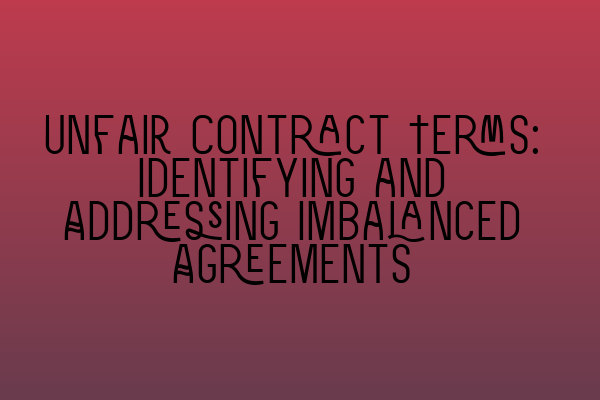Unfair Contract Terms: Identifying and Addressing Imbalanced Agreements
In the world of contract law, ensuring fairness and equity in agreements is of utmost importance. However, imbalance and unfairness can sometimes creep into contracts, leading to potential harm and injustice for one party. It is essential for both solicitors and clients to be aware of unfair contract terms and take proactive steps to address and rectify them. In this blog post, we will explore the concept of unfair contract terms and provide guidance on how to identify and address imbalanced agreements.
What are Unfair Contract Terms?
Unfair contract terms refer to clauses or provisions in a contract that grant unfair advantages to one party while imposing unfair disadvantages on the other. These terms can create an imbalance of power and leave one party significantly vulnerable in case of a dispute or disagreement. Unfair contract terms are typically found in standard form contracts, where one party has significantly more bargaining power than the other.
Identifying Unfair Contract Terms
Recognizing unfair contract terms can be challenging, as they can be buried within lengthy and complex agreements. However, there are several red flags to watch out for:
1. Excessive Limitations of Liability: Contracts may include clauses that unreasonably limit one party’s liability or exclude liability altogether. Such terms can place an undue burden on the other party and are often deemed unfair.
2. Unilateral Variation Clauses: These clauses allow one party to change the terms of the contract without the consent or notification of the other party. Unilateral variation clauses can severely undermine the fairness and stability of a contractual relationship.
3. Unfair Payment Terms: Contracts that impose unjust payment terms, such as excessive penalties, hidden charges, or unfair payment deadlines, can be considered unfair and unbalanced.
4. Unconscionable Terms: Unconscionable terms refer to provisions that are so one-sided and oppressive that no reasonable person would agree to them. These terms are inherently unfair and are generally unenforceable in court.
Addressing Unfair Contract Terms
If you suspect that a contract contains unfair terms, it is crucial to take action to rectify the situation. Here are some steps you can take:
1. Seek Legal Advice: Consult a solicitor with expertise in contract law to review the agreement and identify any unfair terms. They can provide you with guidance on how to proceed and may even help you negotiate fairer terms with the other party.
2. Negotiate with the Other Party: If you have identified unfair terms, approach the other party and express your concerns. Negotiation can often lead to a resolution and the removal of unfair provisions from the contract.
3. Consider Alternative Dispute Resolution: If negotiation fails, consider alternative methods of resolving the dispute, such as mediation or arbitration. These processes allow for a more collaborative and less adversarial approach, providing an opportunity to address the unfair terms outside of court.
4. Take Legal Action: If all else fails, you may need to resort to legal action to challenge the unfair terms. A solicitor experienced in contract litigation can guide you through the process and represent your interests in court.
It is important to note that the law surrounding unfair contract terms may vary across jurisdictions. Therefore, it is crucial to familiarize yourself with the specific laws and regulations applicable to your situation.
Conclusion
Unfair contract terms can significantly impact the rights and interests of parties involved in a contractual relationship. It is essential to be vigilant in identifying these terms and taking the necessary steps to address and rectify imbalances. Seeking legal advice, negotiating with the other party, and exploring alternative dispute resolution methods are valuable strategies in ensuring fair and equitable agreements.
For further resources related to SQE exam preparation and contract law, we recommend checking out the following articles:
– SQE 1 Practice Exam Questions
– SQE 1 Practice Mocks FLK1 FLK2
– SQE 2 Preparation Courses
– SQE 1 Preparation Courses
– SRA SQE Exam Dates
Remember, being aware of unfair contract terms is crucial in promoting fairness and justice within the legal profession. By understanding the signs of imbalance and taking appropriate action, solicitors can ensure that their clients’ rights and interests are protected in contractual relationships.
